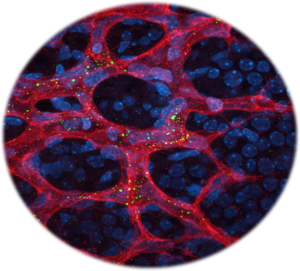
Florian Alonso did his PhD in vascular biology at the Service of Internal Medicine of the University Hospital of Lausanne, in the laboratory of Prof. Jacques-Antoine Haefliger (2006-2011). During this period, he developed a strong experience in the field of intercellular communication mediated by Connexin-(Cx) channels (gap junctions).
He then joined the Service of Vascular Surgery of the University Hospital of Lausanne, as a postdoctoral fellow (2011-2015), where he worked on the discovery of new molecular mechanisms involved during vein graft failure. During the same time, He also developed research projects on the importance of Cx signaling during tumor angiogenesis and tumor progression.
In November 2015, he received a financial support from the French State in the framework of the ‘Investments for the future’ Program IdEx Bordeaux [ANR #-10-IDEX-03-02] allowing him to set up his research on the role of Cx channels within the microvasculature, in the laboratory of Dr. Elisabeth Génot, at the CRCTB-INSERM U1045.
He then focused his work on the extracellular matrix protein fibrillin and was the first to establish its role in angiogenesis. In 2023, he obtained a permanent position at INSERM.
Research Interests:
In multicellular organisms, gap junction channels enable the passage of ions and secondary messengers between the cytosols of adjacent cells to synchronize their functions. Cx are the building blocks of these intercellular gap junction channels and are encoded by a family of highly conserved genes. Our main research aims are directed toward understanding the role of these Cx-channels in the functioning of the vascular system and in the regulation of angiogenesis. Particularly during angiogenesis, since sprout formation requires the coordinated response of endothelial cells to external stimuli, we hypothesize that Cx signaling plays there an important role. In this context our objectives are:
- to explore the importance of the Cx-mediated intercellular communication during vascular sprouting, using relevant in vitro, ex vivo and in vivo models of angiogenesis
- to determine the consequences of inhibiting Cx functions during physiological and pathological angiogenesis
This knowledge will determine the usefulness of a Cx-targeted approach for the development of innovative anti-angiogenic therapies.
Selected Publications:
Alonso F*; Domingos-Perreira S*; Le Gal L; Meda P; Jichlinsky P; Nardelli-Haefliger D; Haefliger J-A. Targeting endothelial Connexin40 inhibits tumor growth by reducing angiogenesis and improving vessel perfusion. Oncotarget. 2016 Mar 22;7(12):14015-28
Alonso F*; Le Gal L*; Mazzolai L; Meda P; Haefliger J-A. Interplay between Connexin40 and nitric oxide signaling during hypertension. Hypertension. 2015 Apr;65(4):910-5
Alonso F*; Le Gal L*; Wagner C; Germain S; Nardelli-Haefliger D; Meda P; Haefliger J-A. Restoration of Connexin40 in renin-producing cells reduces the hypertension of Cx40 null mice. Hypertension. 2014 Jun;63(6):1198-20. Editorial commentary.
Alonso F*; Boittin F-X*; Le Gal L; Allagnat F; Bény JL; Haefliger J-A. Connexins and M3 muscarinic receptors contribute to heterogeneous Ca(2+) signaling in mouse aortic endothelium. Cellular Physiology and Biochemistry. 2013;31(1):166-78. Cover illustration.


In the developing retina, the Cx40 isoform (green) is detected at cell-cell contacts within the angiogenic front
Haefliger J-A; Allagnat F; Hamard L; Le Gal L; Meda P; Nardelli-Haefliger D; Génot E; Alonso F. Targeting Connexin40 expression or function reduces angiogenesis in the developing mouse retina. Arterioscler Thromb Vasc Biol . 2017, in press
Spuul P*; Daubon T*; Pitter B; Alonso F; Fremaux I; Kramer I; Montanez E; Génot E. VEGF-A/Notch-induced podosomes proteolyse basement membrane Collagen-IV during retinal sprouting angiogenesis. Cell Reports. 2016 Oct 4;17(2):484-500
Daubon T; Spuul P; Alonso F; Fremaux I; Génot E. VEGF-A stimulates podosome-mediated Collagen-IV proteolysis in microvascular endothelial cells. Journal of Cell Science. 2016 Jul 1;129(13):2586-98


